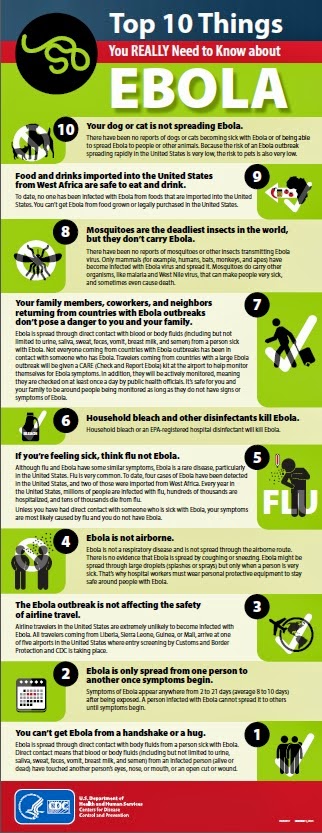WHO: Facts to Know about Ebola
Fast facts
Signs and
Symptoms
Usually manifest within 21 days of exposure
Flu-like
symptoms including:
·
Fever
·
Chills
·
Fatigue
·
Joint pain
·
Headache
Hemorrhage:
in less than 50% of cases and usually in terminal/late stages
“Red eye”
Dark red
discoloration of the soft palate
Transmission
Direct contact
with blood, body fluids, of patients with Ebola virus disease (EVD)
Cannot be
transmitted through air, water, pets, or food
Treatment
The standard of care is "supportive treatment," which means making sure a patient is kept hydrated (via IV fluids), that body salts are balanced, that the patient is well oxygenated, and that his/her blood pressure remains within the normal limits. Also, several trial drugs as well as convalescent plasma from recovered Ebola virus disease (EVD) patients have been used to treat patients with EVD during the current outbreak.
PreventionUnless you have been in direct contact with the blood or body fluids of patients with EVD, you have zero risk of contracting the virus. Risk of widespread Ebola infection in the United States is minuscule.
Vaccine?
Several vaccine trials are underway, but no vaccine is yet available for the general
public
CDC: The Top 10 Thinkgs you REALLY Need to Know about Ebola
Ranya is a third year
medical student at VCU School of Medicine (Medical College of Virginia), with a special interest in viral pathogenesis. Meredith works as a
Communicable Disease Associate for the Epidemiology Office at the Richmond City
Health District. She is involved in the public health response to EVD at a
local level. Both Ranya and Meredith have traveled with RGHA to Pampas Grande, Peru.




